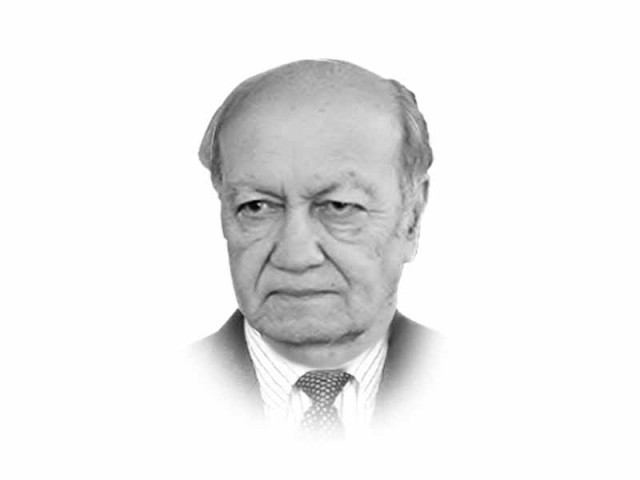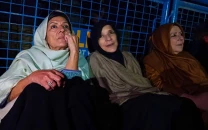Navigating a complex Middle East
The region is torn and a victim of persistence violence strengthening the archaic authoritarian structures

The writer is a retired lieutenant general of the Pakistan Army and a former federal secretary. He has also served as chairman of the Pakistan Ordnance Factories Board
Close personal relationship between Nawaz Sharif and the Saudi royalty, stretching a few decades, is another major factor that draws him to lean heavily on Saudi Arabia. Nawaz Sharif probably feels obliged to the Saudis for having rescued him from the clutches of General Pervez Musharraf and granting him asylum. It is another matter that in an ironic twist of history Saudi Arabia played a major role in facilitating General Musharraf’s safe exile and bestowed generously millions of dollars that he could lead a comfortable retirement. This shows in Pakistan how personal and state relations are intertwined or to be more emphatic how personal relations influence state policy and the voice of parliament or institutional decisions carries little weight. Even if the decision is sound and in the interest of the country, doubts will prevail. One of the main reasons is the secrecy that surrounds the government’s decision. Nonetheless, it is necessary to analyse implications of this alliance on the region and in particular on Pakistan.
The alliance is the brainchild of Prince Mohamed bin Salman and is in the formative stage. It is too early to speculate how it would eventually shape up. However, countries as important and carrying international clout like Turkey, Pakistan, Egypt, Jordan, Indonesia and Malaysia should be able to exercise considerable influence in formulation of the alliance’s policies and its implementation. Saudi Arabia will have to co-opt their views if this alliance has to succeed. There would be no one country’s veto in the alliance.
Moreover, once the aims and organisational structure of the alliance is formulated, and agreed by all parties, then the bigger challenge would be the integration phase. First, it is not necessary that all the member states of the group will be in a position to offer troops. They may have joined to express their solidarity and may confine their role to mere financial and political support. Ultimately, the burden will be on Pakistan, Turkey, Jordan, Egypt, Indonesia, Saudi Arabia and a few others. But if the real mission is to combat terrorism and insurgency then you need a very different force structure to what would require engaging in quelling or taking sides in a civil war. Giving the force carte blanche to engage in short conflicts without a long-term strategy could turn out to be highly detrimental for the region. It is expected that sooner than later a political structure will be created that represents the participating countries to provide political direction and oversight. For now, however, the picture is vague and demands a cautious and well-considered approach.
Allaying Iran’s reservations that border on opposition to the alliance has to be dealt with finesse. This task may not be easy due to the ongoing acute rivalry between Saudi Arabia and Iran. The current situation in Syria and Iraq has accentuated hostilities as the two countries are backing opposite camps. A fundamental challenge for Pakistan is the reality that it has deep strategic ties with Saudi Arabia that stood steadfast during Pakistan’s most trying periods. Though this has been equally reciprocated by Pakistan extending maximum military and political support, whenever needed. Pakistani troops played a major role during the siege of Makkah by al Qaeda insurgents in 1979, or while defending the Yemeni-Saudi border to recall a few.
Pakistan, despite its closeness with Saudi Arabia, has been politically correct and balanced when it comes to taking difficult decisions involving Saudi Arabia and Iran. Islamabad clearly stayed away from joining the Saudi-led coalition against Yemen. It did offend the Saudi monarchy but in hindsight even they would have realised that a military adventure in a country as complex as Yemen was akin to getting stuck in a quagmire. Our leadership played again a constructive role when Saudi Arabia executed the renowned Shia cleric Sheikh Nimr al-Nimr, along with 47 of his followers and relations between Riyadh and Tehran reached a dangerous climax. There was widespread rioting and the Eastern Province of Saudi Arabia was in a rage. So it is not always that Pakistan has followed what the Saudis (or Iranians) wanted from us. We have been discreet and taken positions that were in the larger interests of Pakistan and the Ummah. Moreover, being a part of any anti-Iranian policy will provide justification for Tehran to get closer to India. Apart from the traditional ties between Iran and Pakistan, it is New Delhi’s deep and widening relations with Washington that has contributed to Tehran widening its options and getting closer to Pakistan. This opportunity should be seized for taking our relations to a higher level and using this clout so that the adversarial camps at least remain less hostile towards each other.
If hostilities continue then the beneficiary would be Da’ish and other radical forces that are already fairly strong in the region. Moreover, opposite camps in the Muslim world have facilitated world powers in exploiting the situation to their advantage. Both Riyadh and Tehran rely on their benefactors US and Russia to leverage their power. As a result, they compromise their sovereignty and suffer from its attendant consequences while big powers pursue their agenda.
Consequently, the region is torn and a victim of persistence violence strengthening the archaic authoritarian structures. It is becoming clearer by the day that unless the region moves towards some form of political legitimacy ancient fault lines and centuries-old rivalries will keep the region in turmoil and its people suffering. For positive change to occur, regional peace is a prerequisite.
Published in The Express Tribune, April 12th, 2017.
Like Opinion & Editorial on Facebook, follow @ETOpEd on Twitter to receive all updates on all our daily pieces.













COMMENTS
Comments are moderated and generally will be posted if they are on-topic and not abusive.
For more information, please see our Comments FAQ